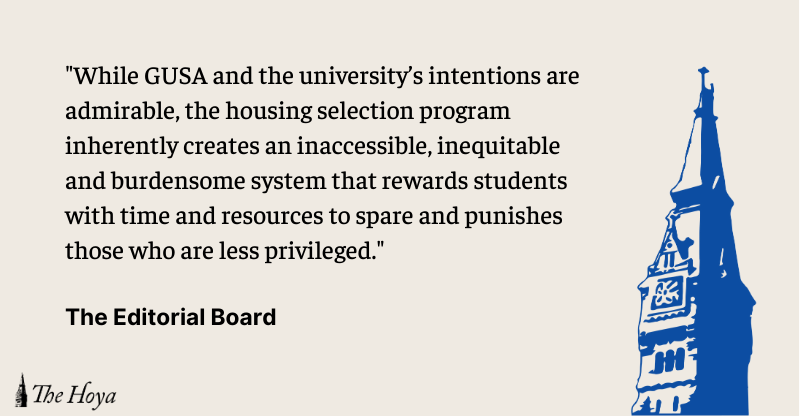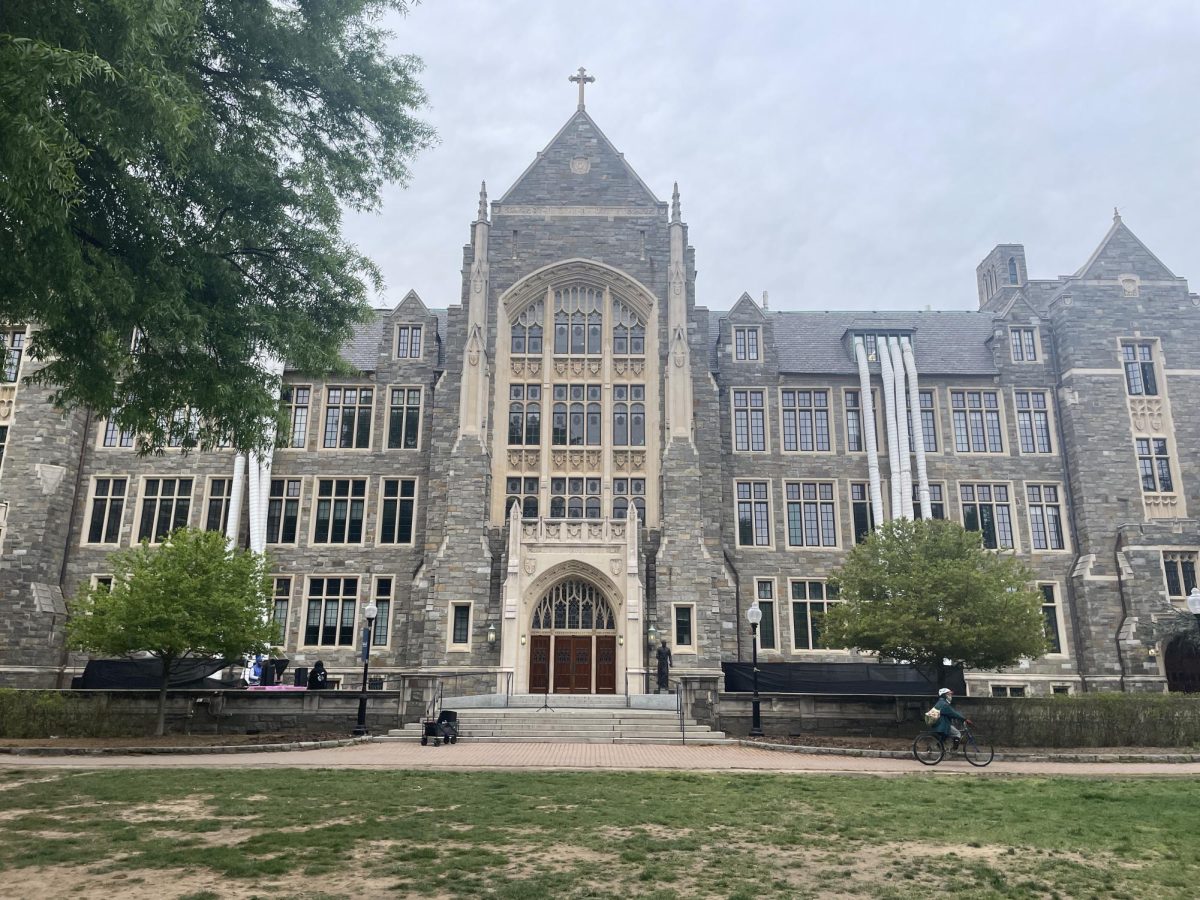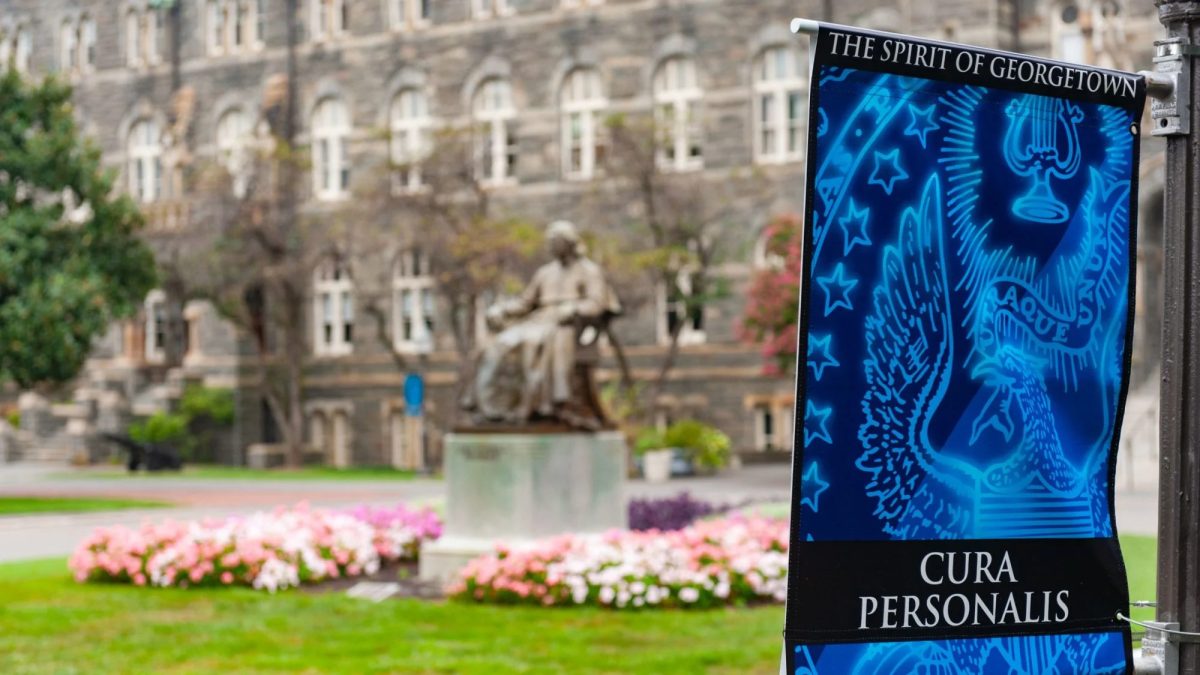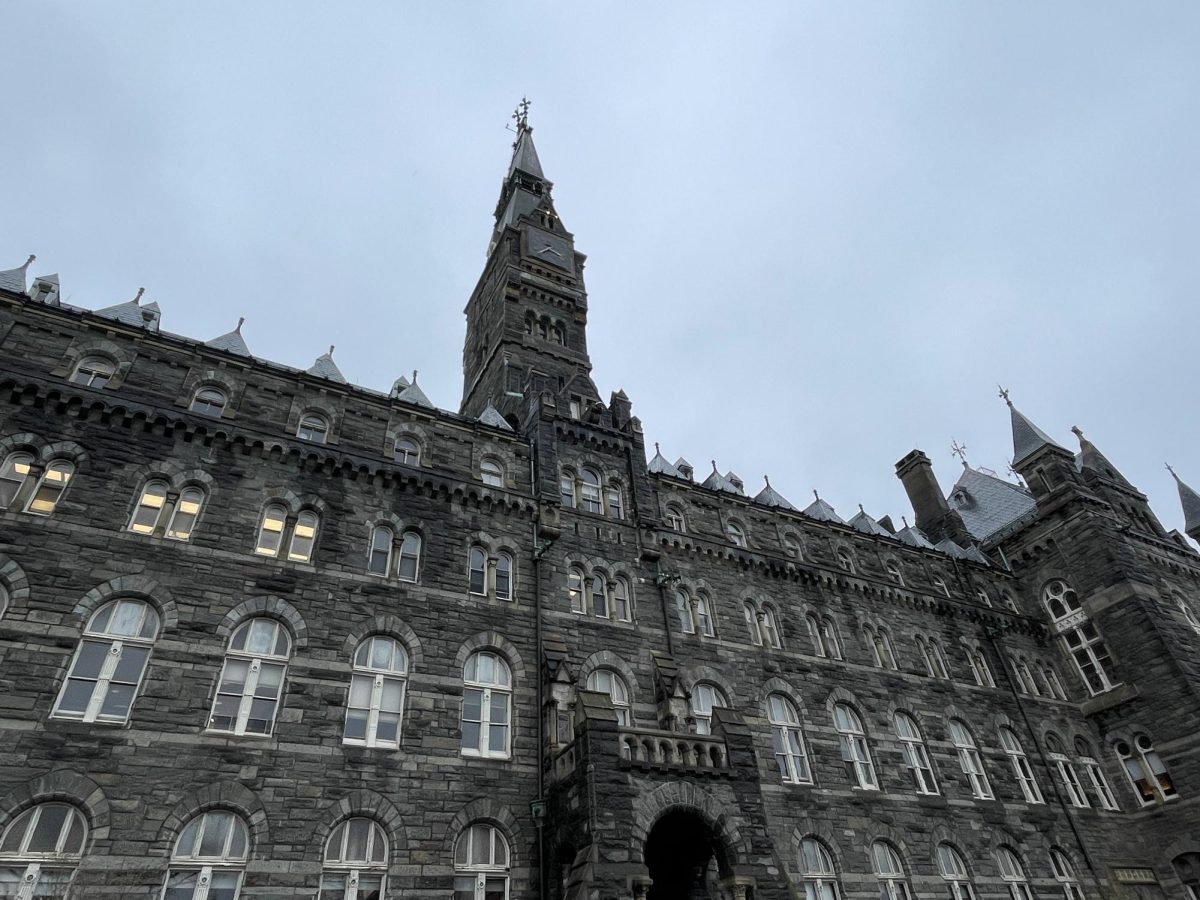Georgetown University’s housing selection process is a constant source of stress for many students, and this year is no different. Especially in light of the significant changes to housing that are taking effect in the 2023-24 academic year following the beginning of the renovation of Henle Village, concern over housing options is higher than ever.
In the same year, the university, in partnership with the Georgetown University Student Association (GUSA), redesigned the “What’s a Hoya” (WAH) system that students use to increase their chances at earning a favorable placement in the housing selection lottery. The program stems from an admirable desire to engage first-year students with campus culture, but it often disproportionately benefits students with access to resources and time that other students may not have.
Therefore, the Editorial Board calls upon the university to address the inequities that the program creates for some of its students by eliminating systems that allow students to earn points for a better spot in the housing lottery and use an entirely randomized lottery system for rising sophomores.
WAH lets rising sophomores earn “selection points” that can boost one’s chances of receiving desirable housing. Rising sophomores receive a base allotment of two points, while rising juniors and seniors receive three and four, respectively. These points are then averaged with a student’s roommate’s points to determine their collective group’s placement in the housing lottery. But if averages are tied — for example, if a student’s group and 300 other groups all have the same points when all of them are averaged — then the housing system returns to a normal, randomized lottery among all the tied groups.
Giving upperclassmen a leg up in the process is reasonable, as they deserve priority for better housing. The WAH program, though, is less justifiable.
Rising sophomores could earn extra housing points in past years by attending up to three forums on student life at Georgetown that were each worth 0.10 “points,” allowing a rising sophomore to reach a maximum of 2.30 points from the base of two. This year, however, GUSA rolled out substantial changes to the program that have added many more requirements for earning points, leading to stress and confusion among first-year students.
The program is now divided into three categories: “Navigating Your Georgetown,” “Community Resources” and “Georgetown Spirit,” each of which can yield 0.10 housing points. Every category has between four and nine activities that are each assigned point values from 0.25 to 1.00, and to earn housing points for a category, a student must complete enough activities within the category to reach a sum of at least 1 point. Like previous years, students can attain a maximum of 2.30 housing points by completing 1 point worth of activities in each category.
Activities include attending events at the Cawley Career Fair Center; listening to a Center of Student Engagement and GUSA information session; going to the meetings of two clubs they are not a part of; and attending three Georgetown sporting events, among many others.
Some first-years think this point system creates an unnecessarily competitive culture among students.
“Personally, I think it’s slightly dystopic for an institution to essentially make students compete against one another for leverage on better living standards by evaluating how much they embody the ‘Georgetown Spirit,’” Halina Kwan (SOH ’26) wrote to The Hoya.
The list of activities to earn housing points is extensive among all three of the aforementioned categories, but the amount of time required for these activities precludes many first-years from fully participating in WAH.
“With managing a heavy course load and extracurriculars, it’s difficult to find time to complete the What’s A Hoya requirements,” Olivia Matlaga (CAS ’26) wrote to The Hoya.
Some of the specific activities the program offers are also concerning, including the option to earn 0.50 points in the “Community Resources” category by attending ESCAPE, an overnight retreat to the Calcagnini Contemplative Center.
WAH offers a promo code that gives students a 50% discount to cover the attendance fee, and provides 100% fee waivers for students who may need it. Nevertheless, there are implicit costs associated with spending copious amounts of time participating in these activities, especially for students who have jobs and other commitments in addition to an already rigorous course and extracurricular load. The system favors wealthier students who may not need to work, which enables them to devote more time to the program.
The program has tried to ensure that all students are able to participate, yet striking a balance with student schedules can be difficult, GUSA’s WAH team said.
The Editorial Board is also concerned about the option for students to earn housing points by attending a Campus Ministry Service. Students are able to attend various religious worship services or meditations and submit a written reflection to earn 0.25 points in the “Navigating Your Georgetown” category.
Once again, while these requirements with good intentions encourage students to engage with religions they may have never encountered, it raises concerns that students will attend religious services without genuine interest in engaging with interreligious diversity. Seeing their faith used for housing points, students have expressed that it is insensitive to attend a religious service merely for a better dorm.
“We have students come all the time for housing points or for a Problem of God assignment. On the one hand, at times it can feel a little awkward to have people obviously there to complete a requirement sit in on what is a personally significant time of the week for me. It can kind of feel like I’m being spectated rather than joined in a service,” Naomi Gould (CAS ’26), a first-year representative of the Jewish Student Association, wrote to The Hoya.
“On the other hand, I really do appreciate when non-Jewish students come to Shabbat with open minds and a desire to learn about a different religion and culture. It’s really meaningful to be able to share something important to me with others, so if people coming to fulfill a requirement make an effort to get something out of their experience other than a good grade or an extra What’s A Hoya point, then I not only have no problem with it but I really appreciate it,” Gould wrote.
The WAH team said students can choose to attend any Campus Ministry event that they choose, adding that there are nonreligious meditations offered that nonreligious students could take part in. Moreover, they explained that activities related to Campus Ministry can be avoided altogether and students can participate in other activities to gain points.
Any university should encourage its students — particularly first-years — to learn about their university and engage with its culture, and it is clear that this is GUSA’s purpose in designing the activities the way it did. When these activities pose ethical questions and financial barriers, though, they must be reformed.
In explaining the intent behind the program, GUSA’s WAH team wrote, “the goal of WAH this year is actually not housing points — that’s just a bonus on top. The goal is actually exposing first year students to resources, places, and experiences Georgetown offers that they might not otherwise experience during their time on the Hilltop.”
While GUSA and the university’s intentions are admirable, the program inherently creates an inaccessible, inequitable and burdensome system that rewards students with time and resources to spare and punishes those who are less privileged.
Encouraging first-year students to learn about Georgetown is valuable — but encouraging them to commit time and resources that they may not have to gain 0.3 housing points is not.
The Hoya’s Editorial Board is composed of six students and is chaired by the opinion editors. Editorials reflect only the beliefs of a majority of the board and are not representative of The Hoya or any individual member of the board.


















